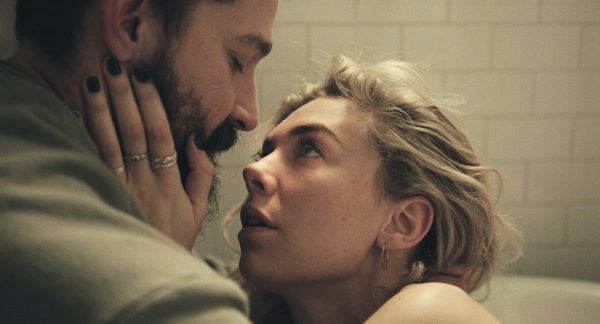
Pieces of a Woman is not an easy film to motivate people to watch in these trying times. While many are understandably striving for comfort and escape, here is a film that is about the sudden death of a newborn and the would-be mother’s subsequent attempt to process the tragedy.
Yet, regardless of one’s readiness for this difficult material, the film’s pivotal sequence is virtuosic. In it, Martha (Vanessa Kirby), determined to have a home birth, experiences her first contractions in the kitchen and goes into labor. Her partner, Sean (Shia LaBeouf), calls the midwife, only to find that she is unavailable and another midwife, Eva (Molly Parker), will take her place. What follows is gripping, believable, and heartrending, both for the skill with which the filmmaker makes this sequence cinematically dynamic, the skill and bravery of the actors, and the frankness with which the film depicts childbirth.
Though the rest of the film does not match its first chapter, it is not negligible. The time line is divided according to dates as we follow Martha from the fall to April as she wanders alone through her life. Meanwhile, Sean struggles with the extent to which she has withdrawn from him and buried her emotions. He cannot, for instance, understand why, after a few months, she is ready to dismantle the room they had set up for their baby girl while he is not. Martha’s mother (Ellen Burstyn) helms a lawsuit against Eva and expects Martha to be as motivated by this endeavor as she is, yet Martha remains indifferent. We watch her listlessly wander about Boston and at family events and handle various postmortem tasks, such as deciding what will be done with her daughter’s body.
What is communicated, overwhelmingly, is that Martha’s grief is not something her friends and family are able to comprehend. It is not that they do not understand her, but they are more concerned with their needs than they are with hers, and they are unaware of this, therefore she is isolated. Nevertheless, director Kornél Mundruczó and writer Kata Wéber place too much faith in the ability of Martha’s unmoving, steely façade to carry the film. There are undeniably strong scenes, much of the dialogue is believably naturalistic, and Mundruczó has a talent for indoor tracking shots that give certain sequences a rich and immersive feel. But too many scenes strike the same tone, and Martha seems to hope for so little except to be given some peace that the drama cannot help but lose steam. An overused score often does the emotional work for viewers, and toward the end, there is a speech that too neatly sums up the ideas of the film to be convincing.
Still, there is not a single weak performance, with Kirby as the clear standout. If the writing lacks variety, her performance brims with repressed emotion. And one respects the filmmakers for tackling a taboo subject. Mundruczó and Weber, having made the stunning parable White God in 2014, show no sign of repeating subject matter in their films, and while the results might be mixed, it is heartening to see this writer-director team follow their relentless curiosity.






Leave A Comment